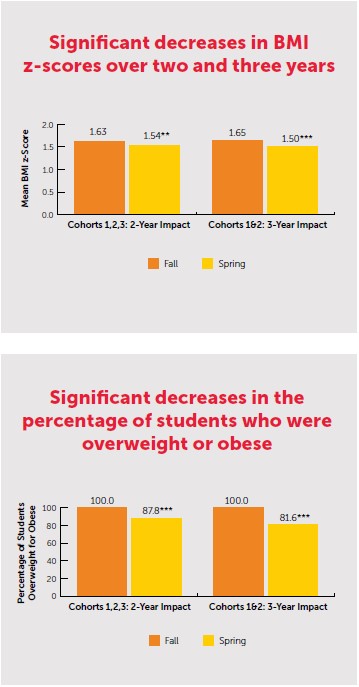
For overweight and obese middle and high school students enrolled in Harlem Children’s Zone (HCZ) after-school programs, participation in Healthy Harlem led to sustained positive impacts on physical fitness and weight status, according to interim findings from Mathematica. To assess Healthy Harlem’s effectiveness, researchers monitored students during an initial baseline year and then measured program impacts after two and three years of participation. The findings reveal that participation in Healthy Harlem’s Get Fit and Prevention components resulted in lower body mass index (BMI), a reduction in the percentage of students who were overweight or obese, and increased levels of physical fitness.
Specifically, the study’s interim report documented the following:
-
A 5.5 percent decrease in mean BMI z-scores after two years of participation and a 9.0 percent decrease after three years of participation. A BMI z-score reflects the number of standard deviations a student’s BMI is from the mean BMI for a reference population.
-
A decrease of 12.2 percentage points in the percentage of students who were overweight or obese after two years, and a decrease of 18.4 percentage points after three years.
-
An increase in the percentage of students considered to be within the Harlem Fitness Zone, a measure of fitness based on a student’s ability to complete a minimum number of laps, defined for age-and-gender subgroups.
In 2011, HCZ determined that nearly half of students ages 12 and older who participated in HCZ programs were overweight or obese. To combat this issue, HCZ partnered with the JPB Foundation to design and implement Healthy Harlem, an intensive set of services that promote healthy lifestyles, provide nutrition education, and provide opportunities for physical activity. Mathematica conducted a comprehensive evaluation of Healthy Harlem, including an implementation study that examined program rollout and an impact study that assessed short- and long-term program impacts across several sets of outcomes, including BMI and fitness.
Learn more about this study in two new issue briefs, The Impact of Healthy Harlem on the Body Mass Index and Weight Status of Adolescents after Two and Three Years and The Impact of Healthy Harlem on Student Fitness Outcomes after Two and Three Years. More information about Mathematica’s nutrition research is available by visiting Mathematica’s National Nutrition Month webpage.

